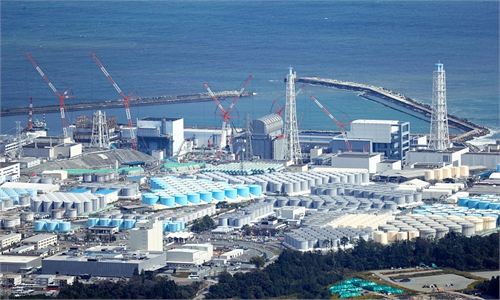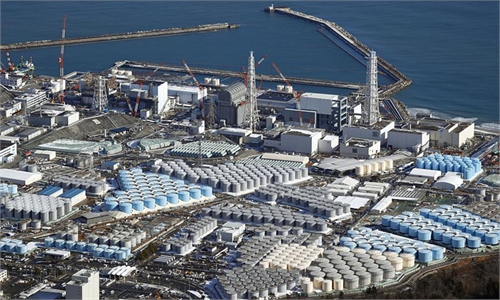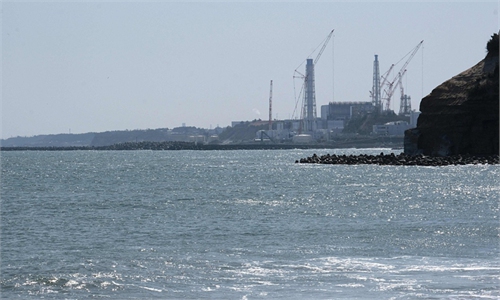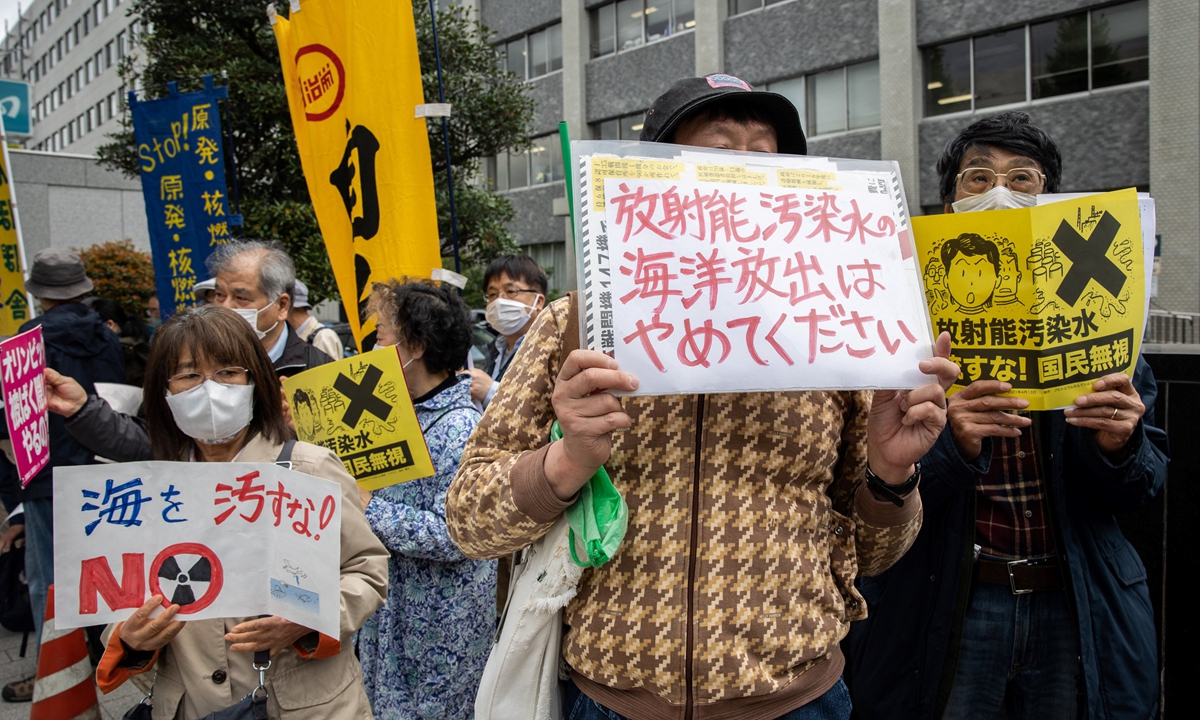
Demonstrators hold slogans during a protest against the Japanese government's plan to release more than a million tonnes of treated water from the stricken Fukushima nuclear plant into the ocean, outside the prime minister's office in Tokyo on April 13, 2021. Photo: AFP
The Japanese government made a final decision on Tuesday to discharge contaminated radioactive wastewater from the Fukushima Daiichi nuclear plant into the sea. This is a shameful decision. Once implemented, the move will pose a long-term threat to the ecology of the entire Pacific Ocean and regions beyond.The nuclear wastewater resulted from the 2011 nuclear accident in the plant. The wastewater was mainly caused by cooling the nuclear reactor core in the accident. Being made up of both highly polluted wastewater and contaminated underground water, they had been collected and kept in storage tanks. Right now about 1.25 million tons of wastewater are stored in the tanks, enough to fill 500 Olympic-sized swimming pools.
Japan said the over 1,000 tanks are running out of space and will be filled up by 2022, so the wastewater has to be dealt with. Japan claimed it has processed the wastewater and removed contaminants, and the wastewater will be diluted to meet safety standards before being released into the ocean.
But those above-mentioned claims have not been supervised by neighboring countries and international environmental protection organizations. What's important is there has never been any precedent in the world of discharging polluted water from a nuclear accident into the ocean. Hence, it is hard to assess the long-term consequences of such discharge. The International Atomic Energy Agency, which did not oppose Japan's approach, has no relevant experience.
The fundamental reason why Japan dares to do so is that it has been indulged by the US. On Tuesday morning (Beijing time), US Secretary of State Antony Blinken even tweeted, "We thank Japan for its transparent efforts in its decision to dispose of the treated water."
How magical this gratitude is! It's like conducting a funeral in the way a wedding is being held.
Imagine what would happen if other countries do the same thing. No matter how "transparent" they are, the US would never dodge accusing them, not to mention award them a "medal." The attitude of Western public opinion would be fiercer. The US tactic - defending those who belong to its own faction and attack those who don't - has reached a peak. It has also played the card of double standards too much and has called disgrace an honor, treated evil as being responsible. It is a shame of modern human civilization.
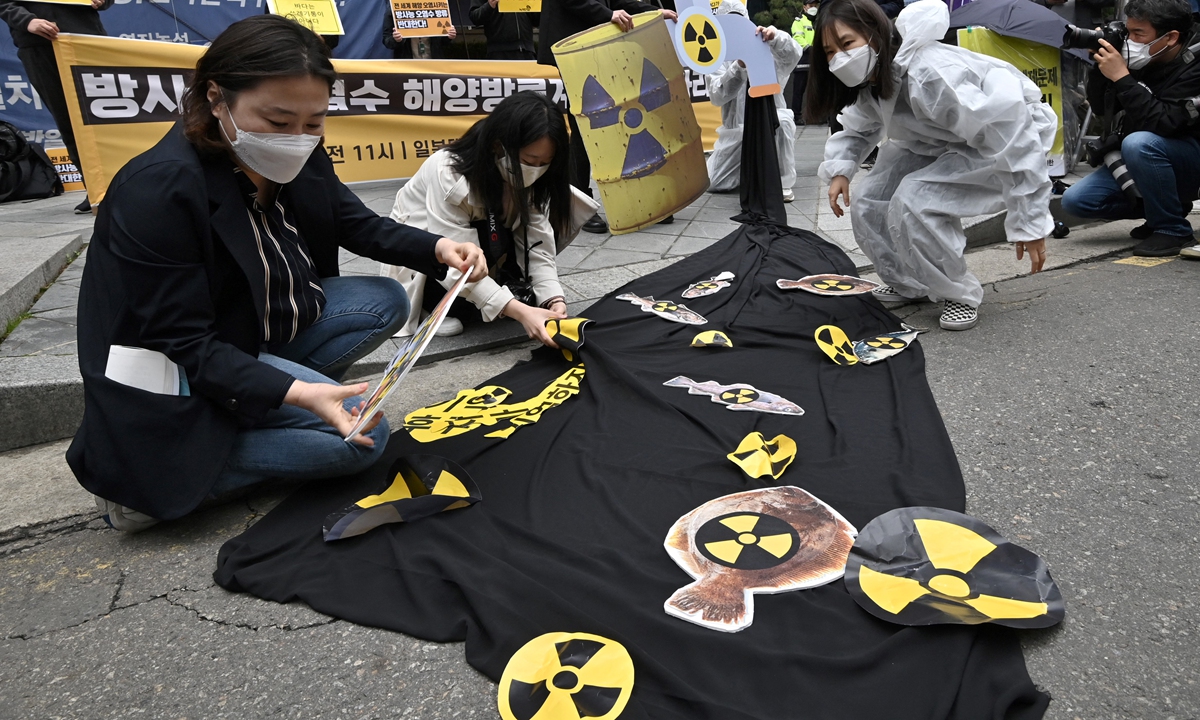
South Korean environmental activists display pictures of fishes with radioactivity warning signs during a protest against Japan's decision on releasing Fukushima wastewater, near the Japanese embassy in Seoul on April 13, 2021. Photo: AFP
An apparent reason for the US to adopt its current attitude is that Japan is geographically far away from it. If Japan discharges the wastewater near the US, Washington will surely show another stance. But the US may have miscalculated. With the world's strongest currents along the coast of Fukushima, radioactive materials could spread to the entire Pacific Ocean. It is purely illusionary and shortsighted for the US to think it could detach itself from the possible crisis.The US' appreciation of Japan is a wicked geopolitical performance, which will exemplify Japan's move. When the wastewater causes long-term damage to the environment, the US' move will also be a political deceit - however bad things can be bleached and rationalized through political and public opinion methods while qualitative and judicial power goes beyond everything else.
It is understandable that the radioactive wastewater has to be treated one way or the other eventually. But Japan hasn't done enough yet with all the possible means at hand. Its research on the risks of pollution is far from sufficient and it lacks communication with its neighboring countries.
Instead, Tokyo has focused on winning the support of Washington. At last, the Japanese government has chosen the easiest and cheapest way to dump the wastewater into the ocean - it has maneuvered international politics to greatly reduce its cost of properly treating the wastewater.
It might be two years before Japan dumps the wastewater. China needs to speed up to make its plans for countermeasures and do its utmost to protect the safety of its own coastal area, especially fisheries.
The Chinese government should create conditions for fishery workers who will be affected to claim compensation and help them get the same compensation with that for Japanese fishermen. The scenario should never be allowed in which Japan dumps wastewater and people in its neighboring countries pay the price for it.
